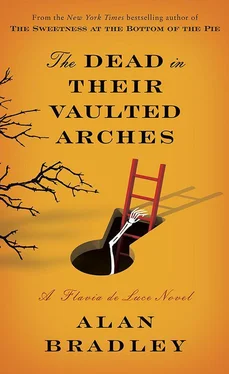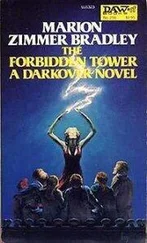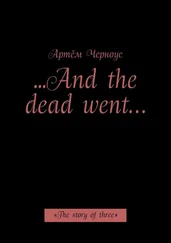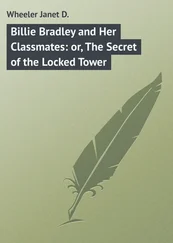But to whom had she been speaking? Since she and Father were clearly in front of the camera, who had been behind it?
What unseen third party had been present at that long-ago picnic?
My options of finding out seemed limited. Feely and Daffy—at least Daffy, for certain—had been too young to remember.
And I could hardly ask Father without admitting to finding and developing the forgotten film.
I was on my own.
As usual.
“Feely,” I said, stopping her dead in the middle of the Andante cantabile from Beethoven’s Piano Sonata No. 8, the Pathétique .
Any interruption when she was playing made Feely furious, which gave me the upper hand automatically as long as I remained perfectly calm, cool, and collected.
“What?” she demanded, jumping to her feet and slamming down the lid on the keyboard, which made a lovely sound: a kind of harmonic mooing that went on echoing through the piano strings for a surprisingly long time, like the Aeolian harps whose strings, Daffy had told me, were played by the wind.
“Nothing,” I said, forming my face into its slightly-hurt-but-bearing-up-in-spite-of-it look. “It’s just that I thought you might like a cup of tea.”
“All right,” Feely demanded. “What are you up to?”
She knew me as well as the magic mirror knew the wicked queen.
“I’m not up to anything,” I replied. “I was merely making an effort to be nice.”
I had her off balance. I could see it in her eyes.
“Yes, all right, then,” she said suddenly, seizing the opportunity. “I think I should rather fancy a cup of tea.”
Ha! She thought she’d won, and the game had barely even begun.
“Her Majesty is demanding a cup of tea,” I told Mrs. Mullet. “If you’ll be so good as to make one, I’ll take it in to her myself.”
“Of course,” said Mrs. Mullet. “You shall ’ave it in two shakes of a dead lamb’s tail.”
Mrs. M always said “in two shakes of a dead lamb’s tail” when she was peeved but didn’t want to show it.
“ ‘A dead lamb’s tail’ is a way of saucin’ ’em off without gettin’ yourself into ’ot water. It means ‘kiss my chump’ without actually sayin’ so,” she had once confided, but had now, obviously, forgotten she’d told me.
Feely was by this time back into the Beethoven sonata. I put the teacup silently on the table and sat down in a bolt upright, attentive position with my knees together, my hands folded daintily in my lap, modeling my posture on Cynthia Richardson, the vicar’s wife.
I even pursed my lips a little prunishly.
When Feely had finished, I let a respectful silence hang in the air while I counted to eleven, partly because it was my age (although not for much longer) and partly because eleven seconds seemed to me a perfect balance between awe and insolence.
“Feely, I was thinking …” I said.
“How novel,” she interrupted. “I hope nothing was damaged.”
I ignored her.
“Have you ever thought of playing for the cinema? Like Brief Encounter , or the Warsaw Concerto in Dangerous Moonlight ?”
“Perhaps,” she said rather dreamily, forgetting her recent sarcasm. “Perhaps one day I shall be asked.”
Feely’s only professional film performance had been as a pair of disembodied hands in a never-to-be-completed Phyllis Wyvern film, of which only a few scenes had been shot at Buckshaw before its star came to what I believe is called rather a sticky end.
I knew how disappointed Feely had been.
“I remember how beautiful your hands were in the film. It was remarkable, considering that you’d never before so much as seen a ciné camera.”
I waited for her to contradict me but she didn’t.
“Some people are fortunate enough to have had ciné films taken of them when they were children. They say that it builds much greater confidence for later on. Eileen Joyce said so on the BBC.”
This was a brazen lie. Eileen Joyce had said no such thing, but I knew that since she was Feely’s musical idol, the mere mention of the famous pianist’s name would add credibility to my twisting of the truth.
“Too bad there were no ciné films taken of you when you were a child,” I said. “It might have given you a leg up.”
Feely, lost in thought, gazed out the drawing room window and across the ornamental lake.
Was she thinking of that long ago day when she was seven? I couldn’t leave it to chance.
“Odd, isn’t it,” I prompted, “that Harriet didn’t own a ciné camera? I should have thought that someone like her would have—”
“Oh, but she did!” Feely exclaimed. “Before you were born. But when you came along she put it away—for obvious reasons.”
Ordinarily I’d have made some rude comeback, but necessity, as someone once remarked—or should have remarked—is the mother of keeping your lip zipped.
“Obvious reasons?” I asked. I was willing to suffer any indignity to keep this conversation alive.
“She didn’t want to risk breaking it.”
I laughed too loudly, hating myself. “I’ll bet she wasted lots of film on you, though,” I said.
“Miles of it,” Feely said. “Simply miles, and miles, and miles.”
“Where is it, then? I’ve never seen it.”
Feely shrugged. “Who knows? Why are you so suddenly interested?”
“Curiosity,” I said. “I believe you, though. It sounds so like Harriet to have wasted all that film on others. I wonder if anyone ever thought to take any films of her?”
I could hardly put it any more plainly than that.
“Not that I remember,” Feely said, and gave herself back to Beethoven.
I stood behind her, peering over her shoulder at the music, an invasion of her personal boundaries which I know perfectly well gives her the creeps.
Nevertheless, she ignored me and kept on playing.
“What does Tempo rubato mean?” I asked, pointing at her penciled words in the margin.
“Stolen time,” Feely said without missing a note.
Stolen time!
Her words hit me in the stomach like a sledgehammer!
Wasn’t that what I was doing by developing a film that was taken before I was born? Stealing time from the past of others and trying to make it my own?
For some stupid reason my eyes were suddenly full of warm water, dangerously close to brimming over.
I stood for a while behind my sister, letting the Pathétique wash over me.
After a time, I reached out and put my hand on her shoulder.
We both of us pretended it wasn’t happening.
But both of us knew that it was.
Because Harriet was coming home.
FIVE
NOW, STILL CRADLED IN the comforting upholstery of the Rolls-Royce, I roused myself from my memories. We had not yet reached Buckshaw. Outside the car’s windows, the narrow lane was lined on both sides with spectators who had strung themselves out along the weedy verge to watch Harriet’s homecoming. So many of the dear village faces, I thought, starched into stiffness by the death of one of their own.
It was a scene most of them would remember for the rest of their lives.
Tully Stoker; his daughter, Mary; and Ned Cropper, the potboy of the Thirteen Drakes, all of whom had been perched on a stile as we approached, jumped smartly to the ground and moved closer. Tully removed his cap, his eyes following the hearse.
Ned craned his neck, trying to get a look at Feely in the backseat of the Rolls, where she rode behind me in silence with Father, Daffy, and Aunt Felicity.
I was sitting beside Dogger, who was at the wheel, and I could see Feely’s face clearly in the mirror. She was staring straight ahead.
No one spoke.
Now we were creeping past the Misses Puddock, Lavinia and Aurelia, the joint proprietresses of the St. Nicholas Tea Room in Bishop’s Lacey. Both of them were dressed in a kind of ancient bombazine which had once been black but was now a shade of curdled brown; both clutched matching Victorian evening bags which were weirdly out of place in a country lane. I couldn’t help wondering what was inside them. Miss Aurelia gave us a cheery wave as we hove alongside, but her sister seized her hand and shoved it down roughly.
Читать дальше












